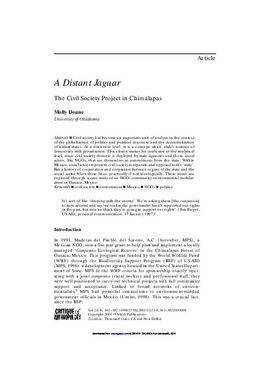| dc.contributor.author | Molly Doane | |
| dc.date.accessioned | 2016-01-14T19:53:10Z | |
| dc.date.accessioned | 2016-03-30T15:36:24Z | |
| dc.date.available | 2016-01-14T19:53:10Z | |
| dc.date.available | 2016-03-30T15:36:24Z | |
| dc.date.issued | 2001-12-01 | |
| dc.identifier.citation | Doane, M. (2001). A Distant Jaguar: The Civil Society Project in Chimalapas. Critique of Anthropology, 21(4), 361-382. doi: 10.1177/0308275x0102100402 | en_US |
| dc.identifier.uri | https://hdl.handle.net/11244/25098 | |
| dc.description.abstract | Civil society has become an important unit of analysis in the context of the globalization of politics and political discourse and the decentralization of nation-states. At a discursive level, it is a concept which elides notions of democracy with privatization. This elision makes for confusion at the analytical level, since civil society rhetoric is deployed by state agencies and those social actors, like NGOs, that see themselves as autonomous from the state. Within Mexico, social actors represent civil society as separate and opposed to the ‘state’. But a history of cooperation and cooptation between organs of the state and the social sector blurs these lines, practically if not ideologically. These issues are explored through a case study of an NGO/community environmental mobilization in Oaxaca, Mexico. | en_US |
| dc.language.iso | en_US | en_US |
| dc.publisher | Critique of Anthropology | |
| dc.subject | civil society | en_US |
| dc.subject | environment | en_US |
| dc.subject | Mexico | en_US |
| dc.subject | NGOs | en_US |
| dc.subject | politics | en_US |
| dc.title | A Distant Jaguar: The Civil Society Project in Chimalapas | en_US |
| dc.type | Research Article | en_US |
| dc.description.peerreview | Yes | en_US |
| dc.description.peerreviewnotes | https://us.sagepub.com/en-us/nam/manuscript-submission-guidelines | en_US |
| dc.identifier.doi | 10.1177/0308275x0102100402 | en_US |
| dc.rights.requestable | false | en_US |
